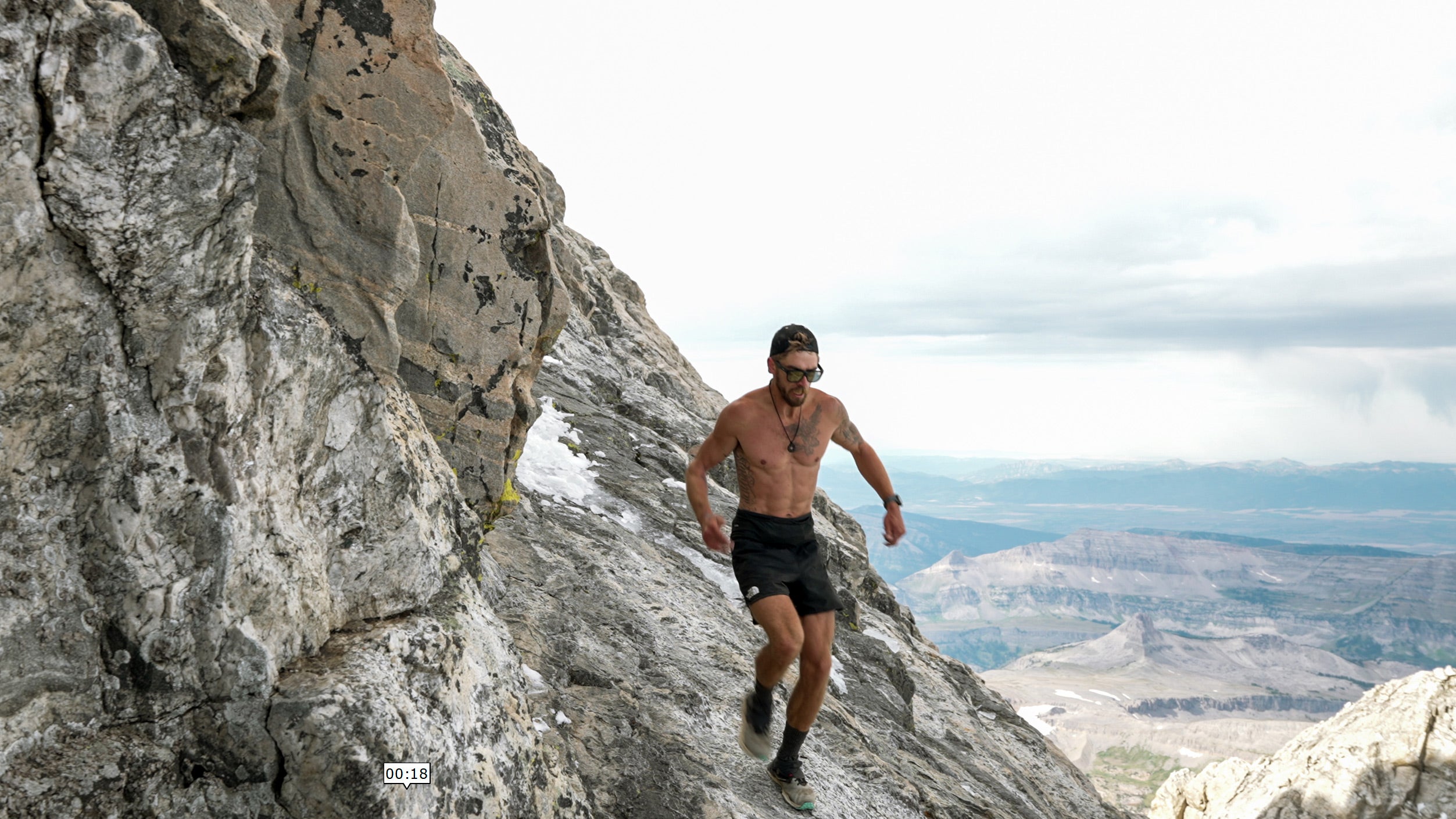Michelino Sunseri Found Guilty of Cutting a Switchback in Grand Teton National Park

Sunseri navigates a sheer section of the route (Photo: Connor Burkesmith)
Update September 19: Legal representatives for Michelino Sunseri confirmed to Outside that they had appealed federal magistrate judge Stephanie A. Hambrick’s earlier decision. The group declined further comment until after scheduling is complete in October.
Trail runner Michelino Sunseri, who skipped a switchback during his 2024 fastest known time attempt in Grand Teton National Park, was found guilty of leaving the designated trail, a federal judge ruled. Court documents obtained by Outside note that while jail time will “not be imposed,” the endurance athlete could face a potential ban from the park and a fine of up to $5,000.
“The Defendant is adjudged GUILTY,” wrote federal magistrate judge Stephanie A. Hambrick of Wyoming in her September 2 verdict. Sunseri left “the Garnet Canyon Trail to use the shortcut of the Old Climber’s Trail,” violating a code restricting hikers’ use on designated trails and prohibiting shortcuts in certain areas, according to the verdict.
In an email to Outside, Sunseri’s legal team at Pacific Legal Foundation said it will appeal the decision.
“We respectfully disagree with the magistrate judge’s ruling. It reifies the enormous claims of power by park superintendents to write federal criminal law. This is well beyond any power the Constitution contemplates for inferior officers—those not confirmed by the Senate—to have. We will appeal,” Michael Poon, an attorney at Pacific Legal Foundation, told Outside.
Sunseri broke the speed record in 2024 for ascending and descending the 13,775-foot Grand Teton trail in Wyoming’s Grand Teton National Park, completing the ascent and descent in two hours, 50 minutes, and 50 seconds. He edged out the previous time set by Andy Anderson in 2012 by just two minutes.
But official chronicler Fastest Known Time rejected Sunseri’s record after his GPS track showed he cut a switchback while descending.
The revelation didn’t just ignite an ethical debate over cutting switchbacks and setting speed records—it also put Sunseri in hot water legally. For cutting off-trail, Sunseri was subsequently charged by the National Park Service with a Class B misdemeanor.
Sunseri’s guilty verdict was issued exactly a year after his botched record.
Sunseri took Old Climber’s Trail, an informal shortcut on the Grand Teton that cuts the 13.1-mile out-and-back route by about a half-mile.
For decades, the informal cut-through was commonly used by climbers descending from the peak. Even so, signs have been placed at the bottom and the top of the shortcut as early as the 1980s, according to testimony from former record holder Bryce Thatcher. Galen Woelk also testified that the signs were there in the 1990s and 2000s
“Closed for regrowth,” reads the bottom sign, facing downhill. A sign at the top of the cut faces uphill, reading “shortcutting causes erosion.”
After ultra-runner Kilian Jornet cut switchbacks in his own record attempts in 2012, lawmakers updated the legal code in 2022 to criminalize cutting switchbacks.
The code Sunseri violated, 36 CFR 2.1 (b), states that a park superintendent “may restrict hiking or pedestrian use to a designated trail or walkway system” and specifies that “leaving a trail or walkway to shortcut between portions of the same trail or walkway, or to shortcut to an adjacent trail or walkway” is illegal.
Sunseri’s legal team says it is appealing his guilty verdict, arguing that the case is an example of government overreach. They add that the trail hadn’t been properly marked closed in the downhill direction Sunseri was traveling.
“The U.S. Attorney and the National Park Service claim that Michelino broke the law because the Grand Teton superintendent had ordered that foot travel be restricted ‘when traveling through signed revegetation and restoration areas,’” wrote Pacific Legal in a case summary.
“The only indication in the direction he was traveling was a small sign off to the side of the trail that said ‘shortcutting causes erosion’—no mention that the trail was closed.”
Additionally, Sunseri’s lawyers argue that the trail closure is unlawful because it stems “from an unconstitutional delegation of legislative power.”
“Only Congress can decide what behavior is and isn’t criminally prohibited, and it cannot delegate that authority away. If Congress wants to define behavior as criminal, it must do so itself, or at the very least, set clear limits that dictate how and why officials can do so,” reads the case summary.
Sunseri’s defense said the athlete was offered several plea deals, all of which either banned him from the park or required him to admit guilt.
“These mountains mean everything to Michelino,” Pacific Legal wrote. “Agreeing to give up such an integral part of his life because of a law he didn’t know he was breaking was unthinkable.”
Correction note: A previous version of this article stated NPS staff formally closed and marked the shortcut. On September 8, 2025, this story was updated to specify that the legal code was changed in 2022 to criminalize cutting switchbacks.